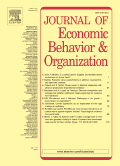Information defaults in repeated public good provision
We study an unexplored type of defaults – information defaults – in a repeated public good provision setting. In our treatments, we vary the default of having or not having contribution information as well as whether the information comes with a positive, zero or negative financial incentive. We find that almost all subjects have the information when this is cost-free or financially beneficial, but around a third have the information even when this is costly. Moreover, a default of not having information leads to a slower unraveling of cooperation which is matched by the beliefs about others’ contributions in these treatments. We also find a secondary informational default effect, challenging previous findings on how defaults work: when the default is no information, subjects do not seek information more often, but they tend to believe that more other subjects seek information.

